a&e features
Well-Strung and far-flung
Gay classical outfit has expanded touring schedule, crossover appeal
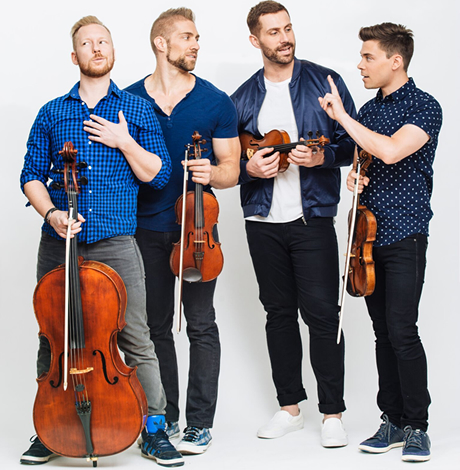
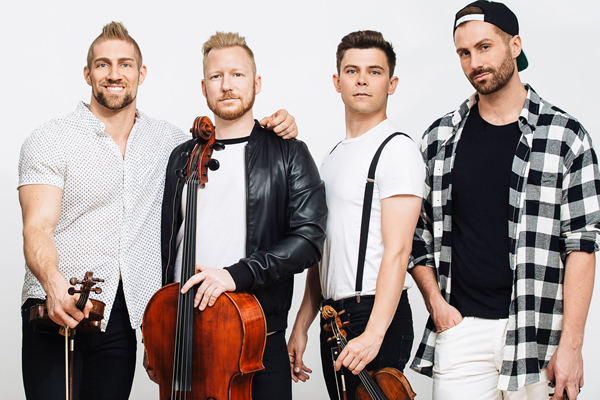
Well-Strung is, from left, Chris Marchant (second violin), Daniel Shevlin (cello), Edmund Bagnell (first violin) and Trevor Wadleigh (viola). (Photo courtesy of Well-Strung)
Well-Strung
Sunday, Aug. 6
6 and 9 p.m.
Clear Space Theatre Company
20 Baltimore Ave., Rehoboth Beach, Del.
$35-100
Well-Strung, an all-gay singing-string quartet, has a musical library that might raise some eyebrows.
Chris Marchant, Daniel Shevlin, Edmund Bagnell and Trevor Wadleigh are known for mixing Lady Gaga and Rihanna hits with the likes of Bach and Vivaldi. It’s a combination not often found in a music performance but Well-Strung wants to introduce classical music to the masses through a more familiar genre — pop. Not only are they known for their cross-genre performances but their youthful presence and good looks have also been a big crowd draw.
The foursome are bandmates and roommates; they all live together in New York City, which makes for easy practice sessions. When not practicing at home, they are on tour sometimes in a different city every day of the week. The hard work has paid off as they have performed for big names such as Barack Obama and Hillary Clinton and were invited to perform at the Vatican. They’ve also shared stages with Kristin Chenoweth, Neil Patrick Harris and Audra McDonald.
The Washington Blade was able to speak with second violinist and group co-founder Marchant as they prep for their Rehoboth Beach, Del., show this weekend. Marchant revealed why he thinks classical and pop music are the perfect match, why Britney Spears tweeted their performance and the pressures of being a sex symbol.
WASHINGTON BLADE: Why did you first start playing music?
CHRIS MARCHANT: My mom made me. I was playing T-ball at the time and I was really bad at it so I wanted to quit. She said I could do that if I played a musical instrument for awhile. So I said OK and I picked violin.
BLADE: How did you get involved with Well-Strung?
MARCHANT: I co-created the group with our manager Mark (Cortale). In 2010 I was up in Provincetown and Cape Cod doing another show because I used to do musical theater prior to this. I would play my violin on the street just to make extra money in the summer time. Mark was a producer in town at a theater and he saw me playing. So we started collaborating on what making a show together might look like. And we started looking for other people who would be interested.
BLADE: Is Well-Strung everyone’s only job or do you have side projects?
MARCHANT: It’s our only job. We kind of transitioned into that at different times. A couple of the guys used to cater or teach music or take freelance gigs. I used to bartend. But nobody really has time anymore.
BLADE: What do you think classical styles bring to pop songs?
MARCHANT: One of my favorite things that we do is explore the crossover between pop and classical music. Classical music is kind of intimidating for the average music listener because the library is just so wide. There’s just so much material. So it can be a little bit daunting to try and get into it. So what we try to do is highlight some of the crossovers in our covers between classical pieces and the pop songs. It’s always amazing to me when a chord progression used in a Bach partita lines up with something that is a mega hit by Taylor Swift today. People don’t realize that the underlying bed of music can be quite similar at times. That’s not always the case. But it’s surprising how often that is true. Also, I think the different textures that classical music creates is a little more different and intricate than pop music today. But we try to show what the past has offered musically and that is not irrelevant by any means.
BLADE: Has anyone told you that after listening to your performance you got them more into classical music?
MARCHANT: Absolutely. That’s one of my favorite things to hear after a concert. That’s one of our goals in a concert is to show people that there’s room on both sides of the aisle. There’s room for people to like both. We can show someone that classical music isn’t this lost, old art but it can still be relevant today. But, also I think it’s really cool when sometimes we play student concerts or do student workshops and they realize that, “Oh my gosh, I don’t have to play this one variety of music to play the violin.” It can be whatever you want it to be. That’s also really cool to me.
BLADE: Do you find yourself frowned upon in the classical music community for doing pop covers?
MARCHANT: If that’s the case, I’m unaware of it. I would say some non-fans have written in response to some of the stuff we’ve done and say that we’re destroying the classical piece with something that was written today. But that just seems close-minded. It doesn’t have to be either/or. It should be both as often as it makes sense too.
BLADE: What’s your favorite song to cover?
MARCHANT: My favorite song that we do is Radiohead’s “Creep.” Our violist arranged that one with “Ave Maria” and (a prelude from) “The Well-Tempered Clavier.” So, it’s actually like Bach wrote “The Well-Tempered Clavier” then a hundred years later Gounod wrote “Ave Maria” over top of that and then we took both and we put Radiohead over it. So it’s like multi-century.
BLADE: Any musicians that have reached out to you about songs you’ve covered from them?
MARCHANT: Britney Spears tweeted a clip of us playing “Toxic” in the hotel lobby of Planet Hollywood where she was doing her Las Vegas residency. And then the Charlie Daniels Band posted our cover of “Devil Went Down to Georgia.”
BLADE: Are your fans mostly gay, straight or a mix?
MARCHANT: It’s a good mix. It started out as more heavily gay because we got our start in Provincetown which is a mostly gay community. From there, the people who saw us there would bring us to their hometowns for concerts. So that’s how we started touring. It did start as a stronger gay demographic and I think that is still very present and we’re grateful for that. But we find our demographic just gets wider the more we tour. We tend to have the most engaged audiences when we’re with suburban families. That’s when we find the most successful concerts.
BLADE: You’re known for your music but you’re known for your looks as well. Is it weird being seen as a sex symbol?
MARCHANT: It is weird. We have always said music comes before anything or any of us looking the way we want to look. We always put the music as a priority and everything else comes second to that. But it is very important, for me anyway, to be consistent while we’re on the road. I always try to get up and find a gym before sound check so I can focus my day a little bit. When we’re in different cities all the time, it can be draining in a certain way. Having a routine at the gym is really good for my sanity.
BLADE: What can people expect from your show in Rehoboth?
MARCHANT: We’re so excited for Rehoboth. That community has been so supportive to us from the beginning. There are really sweet people down there. We have a lot of new music that Rehoboth hasn’t heard yet so we’re excited to debut that there and hopefully see a bunch of our old friends. It’s definitely going to be a fun show. They’ve always been a very supportive community. A lot of energy from the audience. Some audiences I think they feel like, “Oh, we’re seeing a string quartet so we should be quiet and respectful of the classical music.” But we would rather people be loud and engaged just having a good time.
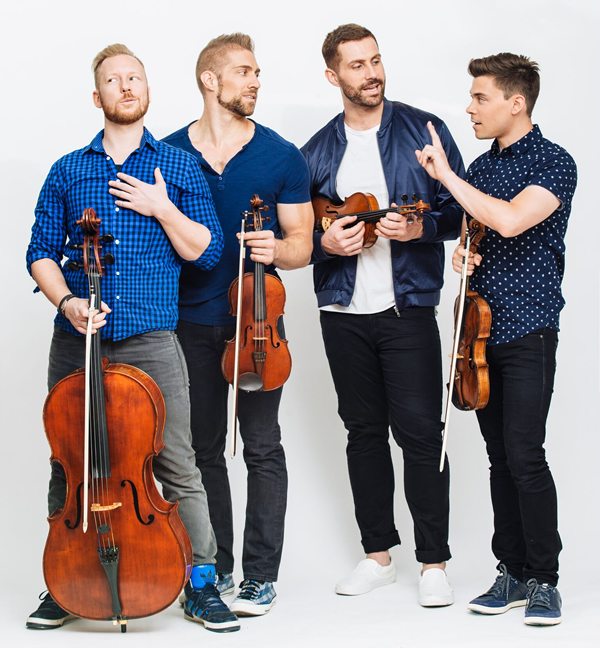
Well-Strung (Photo courtesy of the ensemble)
a&e features
Visit Cambridge, a ‘beautiful secret’ on Maryland’s Eastern Shore
New organization promotes town’s welcoming vibe, LGBTQ inclusion

CAMBRIDGE, Md. — Driving through this scenic, historic town on Maryland’s Eastern Shore, you’ll be charmed by streets lined with unique shops, restaurants, and beautifully restored Victorian homes. You’ll also be struck by the number of LGBTQ Pride flags flying throughout the town.
The flags are a reassuring signal that everyone is welcome here, despite the town’s location in ruby red Dorchester County, which voted for Donald Trump over Kamala Harris by a lopsided margin. But don’t let that deter you from visiting. A new organization, Proudly Cambridge, is holding its debut Pride event this weekend, touting the town’s welcoming, inclusive culture.
“We stumbled on a beautiful secret and we wanted to help get the word out,” said James Lumalcuri of the effort to create Proudly Cambridge.
The organization celebrates diversity, enhances public spaces, and seeks to uplift all that Cambridge has to share, according to its mission statement, under the tagline “You Belong Here.”
The group has so far held informal movie nights and a picnic and garden party; the launch party is June 28 at the Cambridge Yacht Club, which will feature a Pride celebration and tea dance. The event’s 75 tickets sold out quickly and proceeds benefit DoCo Pride.
“Tickets went faster than we imagined and we’re bummed we can’t welcome everyone who wanted to come,” Lumalcuri said, adding that organizers plan to make “Cheers on the Choptank” an annual event with added capacity next year.
One of the group’s first projects was to distribute free Pride flags to anyone who requested one and the result is a visually striking display of a large number of flags flying all over town. Up next: Proudly Cambridge plans to roll out a program offering affirming businesses rainbow crab stickers to show their inclusiveness and LGBTQ support. The group also wants to engage with potential visitors and homebuyers.
“We want to spread the word outside of Cambridge — in D.C. and Baltimore — who don’t know about Cambridge,” Lumalcuri said. “We want them to come and know we are a safe haven. You can exist here and feel comfortable and supported by neighbors in a way that we didn’t anticipate when we moved here.”

Lumalcuri, 53, a federal government employee, and his husband, Lou Cardenas, 62, a Realtor, purchased a Victorian house in Cambridge in 2021 and embarked on an extensive renovation. The couple also owns a home in Adams Morgan in D.C.
“We saw the opportunity here and wanted to share it with others,” Cardenas said. “There’s lots of housing inventory in the $300-400,000 range … we’re not here to gentrify people out of town because a lot of these homes are just empty and need to be fixed up and we’re happy to be a part of that.”
Lumalcuri was talking with friends one Sunday last year at the gazebo (affectionately known as the “gayzebo” by locals) at the Yacht Club and the idea for Proudly Cambridge was born. The founding board members are Lumalcuri, Corey van Vlymen, Brian Orjuela, Lauren Mross, and Caleb Holland. The group is currently working toward forming a 501(c)3.
“We need visibility and support for those who need it,” Mross said. “We started making lists of what we wanted to do and the five of us ran with it. We started meeting weekly and solidified what we wanted to do.”
Mross, 50, a brand strategist and web designer, moved to Cambridge from Atlanta with her wife three years ago. They knew they wanted to be near the water and farther north and began researching their options when they discovered Cambridge.
“I had not heard of Cambridge but the location seemed perfect,” she said. “I pointed on a map and said this is where we’re going to move.”
The couple packed up, bought a camper trailer and parked it in different campsites but kept coming back to Cambridge.
“I didn’t know how right it was until we moved here,” she said. “It’s the most welcoming place … there’s an energy vortex here – how did so many cool, progressive people end up in one place?”
Corey van Vlymen and his husband live in D.C. and were looking for a second home. They considered Lost River, W.Va., but decided they preferred to be on the water.
“We looked at a map on both sides of the bay and came to Cambridge on a Saturday and bought a house that day,” said van Vlymen, 39, a senior scientist at Booz Allen Hamilton. They’ve owned in Cambridge for two years.
They were drawn to Cambridge due to its location on the water, the affordable housing inventory, and its proximity to D.C.; it’s about an hour and 20 minutes away.
Now, through the work of Proudly Cambridge, they hope to highlight the town’s many attributes to residents and visitors alike.
“Something we all agree on is there’s a perception problem for Cambridge and a lack of awareness,” van Vlymen said. “If you tell someone you’re going to Cambridge, chances are they think, ‘England or Massachusetts?’”
He cited the affordability and the opportunity to save older, historic homes as a big draw for buyers.
“It’s all about celebrating all the things that make Cambridge great,” Mross added. “Our monthly social events are joyful and celebratory.” A recent game night drew about 70 people.
She noted that the goal is not to gentrify the town and push longtime residents out, but to uplift all the people who are already there while welcoming new visitors and future residents.
They also noted that Proudly Cambridge does not seek to supplant existing Pride-focused organizations. Dorchester County Pride organizes countywide Pride events and Delmarva Pride was held in nearby Easton two weeks ago.
“We celebrate all diversity but are gay powered and gay led,” Mross noted.
To learn more about Proudly Cambridge, visit the group on Facebook and Instagram.
What to see and do
Cambridge, located 13 miles up the Choptank River from the Chesapeake Bay, has a population of roughly 15,000. It was settled in 1684 and named for the English university town in 1686. It is home to the Harriet Tubman Museum, mural, and monument. Its proximity to the Blackwater National Wildlife Refuge makes it a popular stop for birders, drawn to more than 27,000 acres of marshland dubbed “the Everglades of the north.”
The refuge is walkable, bikeable, and driveable, making it an accessible attraction for all. There are kayaking and biking tours through Blackwater Adventures (blackwateradventuresmd.com).
Back in town, take a stroll along the water and through historic downtown and admire the architecture. Take in the striking Harriet Tubman mural (424 Race St.). Shop in the many local boutiques, and don’t miss the gay-owned Shorelife Home and Gifts (421 Race St.), filled with stylish coastal décor items.
Stop for breakfast or lunch at Black Water Bakery (429 Race St.), which offers a full compliment of coffee drinks along with a build-your-own mimosa bar and a full menu of creative cocktails.
The Cambridge Yacht Club (1 Mill St.) is always bustling but you need to be a member to get in. Snapper’s on the water is temporarily closed for renovations. RaR Brewing (rarbrewing.com) is popular for craft beers served in an 80-year-old former pool hall and bowling alley. The menu offers burgers, wings, and other bar fare.
For dinner or wine, don’t miss the fantastic Vintage 414 (414 Race St.), which offers lunch, dinner, wine tasting events, specialty foods, and a large selection of wines. The homemade cheddar crackers, inventive flatbreads, and creative desserts (citrus olive oil cake, carrot cake trifle) were a hit on a recent visit.
Also nearby is Ava’s (305 High St.), a regional chain offering outstanding Italian dishes, pizzas, and more.
For something off the beaten path, visit Emily’s Produce (22143 Church Creek Rd.) for its nursery, produce, and prepared meals.
“Ten minutes into the sticks there’s a place called Emily’s Produce, where you can pay $5 and walk through a field and pick sunflowers, blueberries, you can feed the goats … and they have great food,” van Vlymen said.
As for accommodations, there’s the Hyatt Regency Chesapeake Bay (100 Heron Blvd. at Route 50), a resort complex with golf course, spa, and marina. Otherwise, check out Airbnb and VRBO for short-term rentals closer to downtown.
Its proximity to D.C. and Baltimore makes Cambridge an ideal weekend getaway. The large LGBTQ population is welcoming and they are happy to talk up their town and show you around.
“There’s a closeness among the neighbors that I wasn’t feeling in D.C.,” Lumalcuri said. “We look after each other.”
a&e features
James Baldwin bio shows how much of his life is revealed in his work
‘A Love Story’ is first major book on acclaimed author’s life in 30 years

‘Baldwin: A Love Story’
By Nicholas Boggs
c.2025, FSG
$35/704 pages
“Baldwin: A Love Story” is a sympathetic biography, the first major one in 30 years, of acclaimed Black gay writer James Baldwin. Drawing on Baldwin’s fiction, essays, and letters, Nicolas Boggs, a white writer who rediscovered and co-edited a new edition of a long-lost Baldwin book, explores Baldwin’s life and work through focusing on his lovers, mentors, and inspirations.
The book begins with a quick look at Baldwin’s childhood in Harlem, and his difficult relationship with his religious, angry stepfather. Baldwin’s experience with Orilla Miller, a white teacher who encouraged the boy’s writing and took him to plays and movies, even against his father’s wishes, helped shape his life and tempered his feelings toward white people. When Baldwin later joined a church and became a child preacher, though, he felt conflicted between academic success and religious demands, even denouncing Miller at one point. In a fascinating late essay, Baldwin also described his teenage sexual relationship with a mobster, who showed him off in public.
Baldwin’s romantic life was complicated, as he preferred men who were not outwardly gay. Indeed, many would marry women and have children while also involved with Baldwin. Still, they would often remain friends and enabled Baldwin’s work. Lucien Happersberger, who met Baldwin while both were living in Paris, sent him to a Swiss village, where he wrote his first novel, “Go Tell It on the Mountain,” as well as an essay, “Stranger in the Village,” about the oddness of being the first Black person many villagers had ever seen. Baldwin met Turkish actor Engin Cezzar in New York at the Actors’ Studio; Baldwin later spent time in Istanbul with Cezzar and his wife, finishing “Another Country” and directing a controversial play about Turkish prisoners that depicted sexuality and gender.
Baldwin collaborated with French artist Yoran Cazac on a children’s book, which later vanished. Boggs writes of his excitement about coming across this book while a student at Yale and how he later interviewed Cazac and his wife while also republishing the book. Baldwin also had many tumultuous sexual relationships with young men whom he tried to mentor and shape, most of which led to drama and despair.
The book carefully examines Baldwin’s development as a writer. “Go Tell It on the Mountain” draws heavily on his early life, giving subtle signs of the main character John’s sexuality, while “Giovanni’s Room” bravely and openly shows a homosexual relationship, highly controversial at the time. “If Beale Street Could Talk” features a woman as its main character and narrator, the first time Baldwin wrote fully through a woman’s perspective. His essays feel deeply personal, even if they do not reveal everything; Lucian is the unnamed visiting friend in one who the police briefly detained along with Baldwin. He found New York too distracting to write, spending his time there with friends and family or on business. He was close friends with modernist painter Beauford Delaney, also gay, who helped Baldwin see that a Black man could thrive as an artist. Delaney would later move to France, staying near Baldwin’s home.
An epilogue has Boggs writing about encountering Baldwin’s work as one of the few white students in a majority-Black school. It helpfully reminds us that Baldwin connects to all who feel different, no matter their race, sexuality, gender, or class. A well-written, easy-flowing biography, with many excerpts from Baldwin’s writing, it shows how much of his life is revealed in his work. Let’s hope it encourages reading the work, either again or for the first time.
a&e features
Looking back at 50 years of Pride in D.C
Washington Blade’s unique archives chronicle highs, lows of our movement
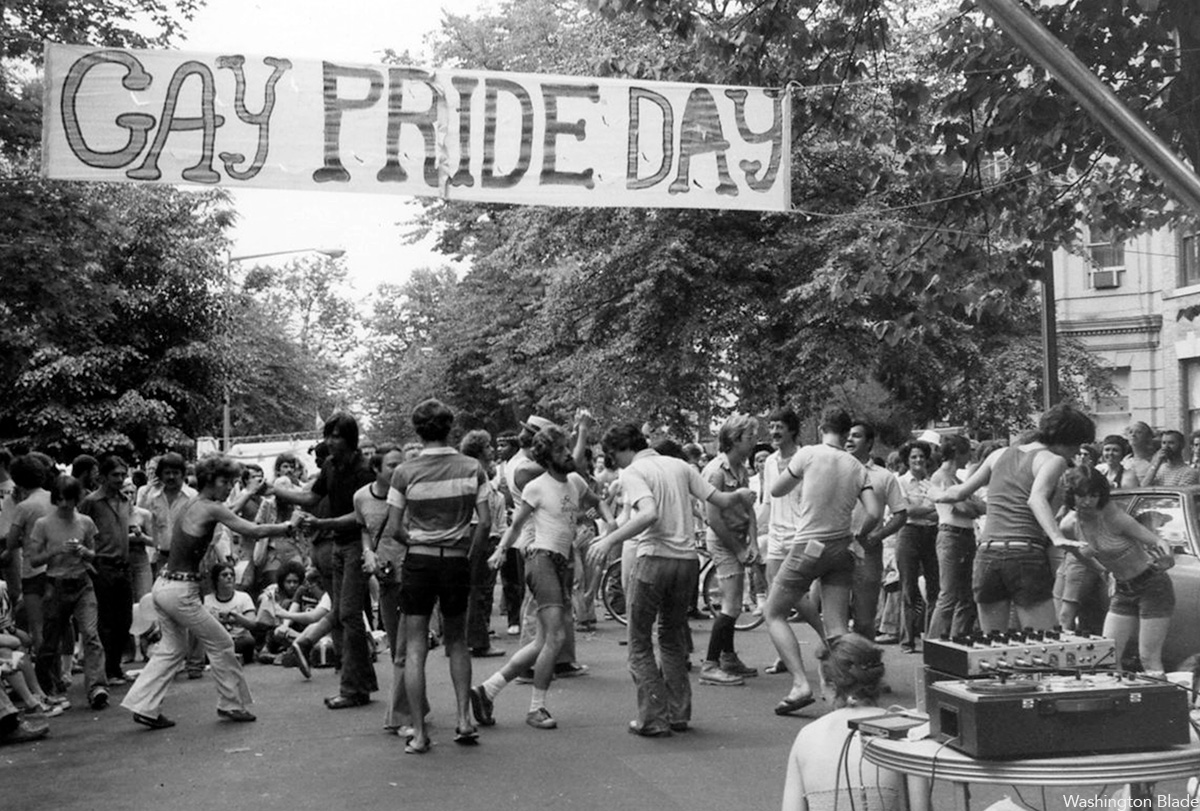
To celebrate the 50th anniversary of LGBTQ Pride in Washington, D.C., the Washington Blade team combed our archives and put together a glossy magazine showcasing five decades of celebrations in the city. Below is a sampling of images from the magazine but be sure to find a print copy starting this week.
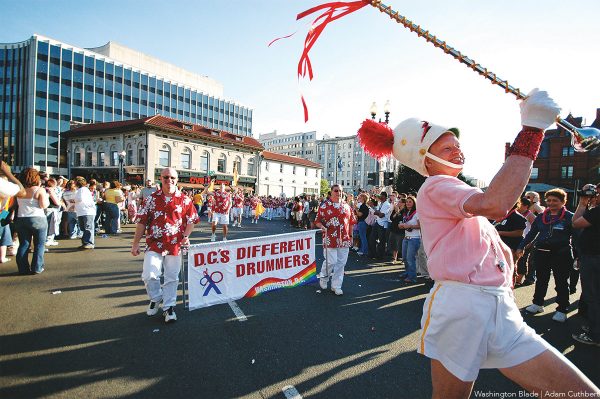
The magazine is being distributed now and is complimentary. You can find copies at LGBTQ bars and restaurants across the city. Or visit the Blade booth at the Pride festival on June 7 and 8 where we will distribute copies.
Thank you to our advertisers and sponsors, whose support has enabled us to distribute the magazine free of charge. And thanks to our dedicated team at the Blade, especially Photo Editor Michael Key, who spent many hours searching the archives for the best images, many of which are unique to the Blade and cannot be found elsewhere. And thanks to our dynamic production team of Meaghan Juba, who designed the magazine, and Phil Rockstroh who managed the process. Stephen Rutgers and Brian Pitts handled sales and marketing and staff writers Lou Chibbaro Jr., Christopher Kane, Michael K. Lavers, Joe Reberkenny along with freelancer and former Blade staffer Joey DiGuglielmo wrote the essays.

The magazine represents more than 50 years of hard work by countless reporters, editors, advertising sales reps, photographers, and other media professionals who have brought you the Washington Blade since 1969.
We hope you enjoy the magazine and keep it as a reminder of all the many ups and downs our local LGBTQ community has experienced over the past 50 years.
I hope you will consider supporting our vital mission by becoming a Blade member today. At a time when reliable, accurate LGBTQ news is more essential than ever, your contribution helps make it possible. With a monthly gift starting at just $7, you’ll ensure that the Blade remains a trusted, free resource for the community — now and for years to come. Click here to help fund LGBTQ journalism.
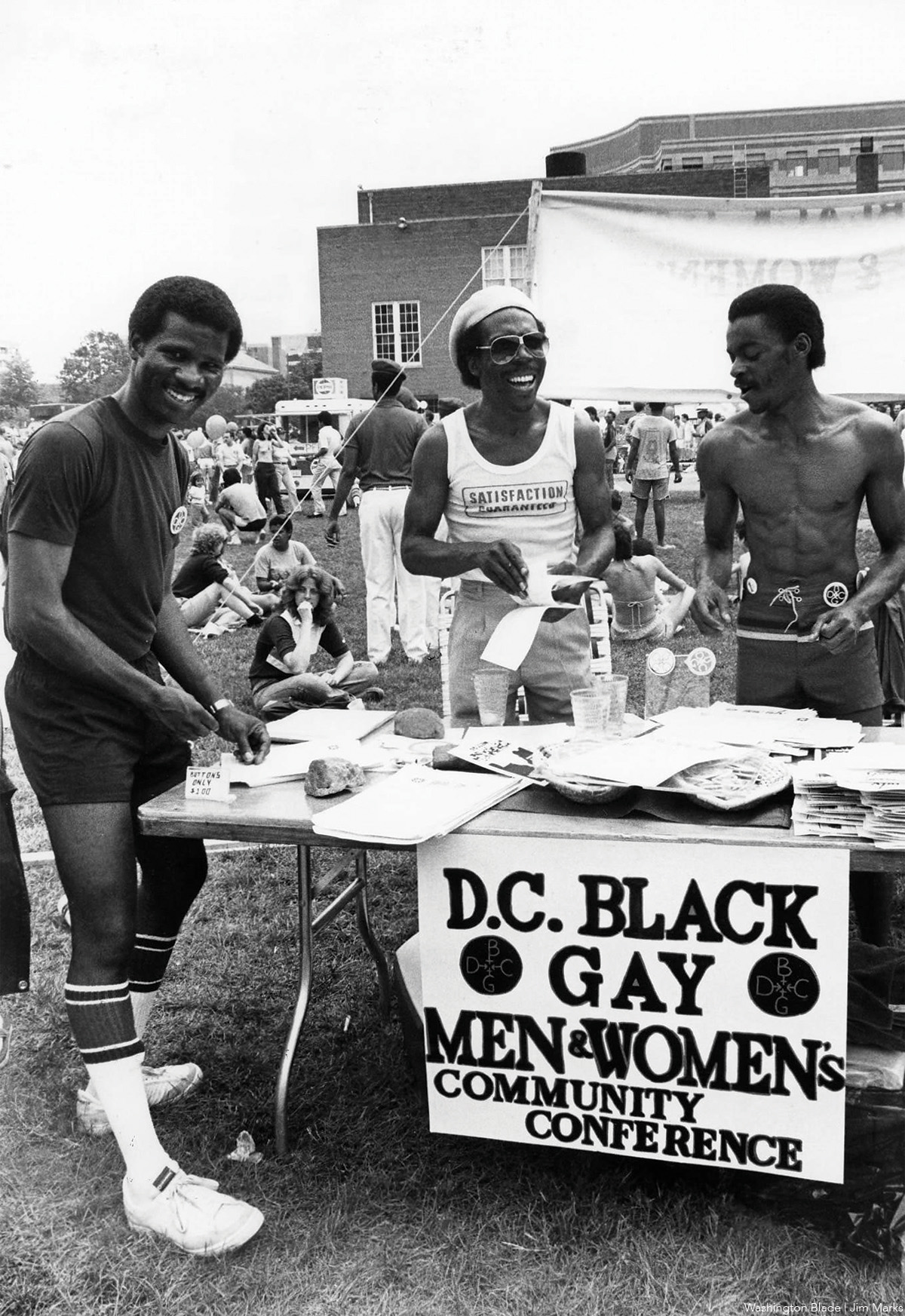
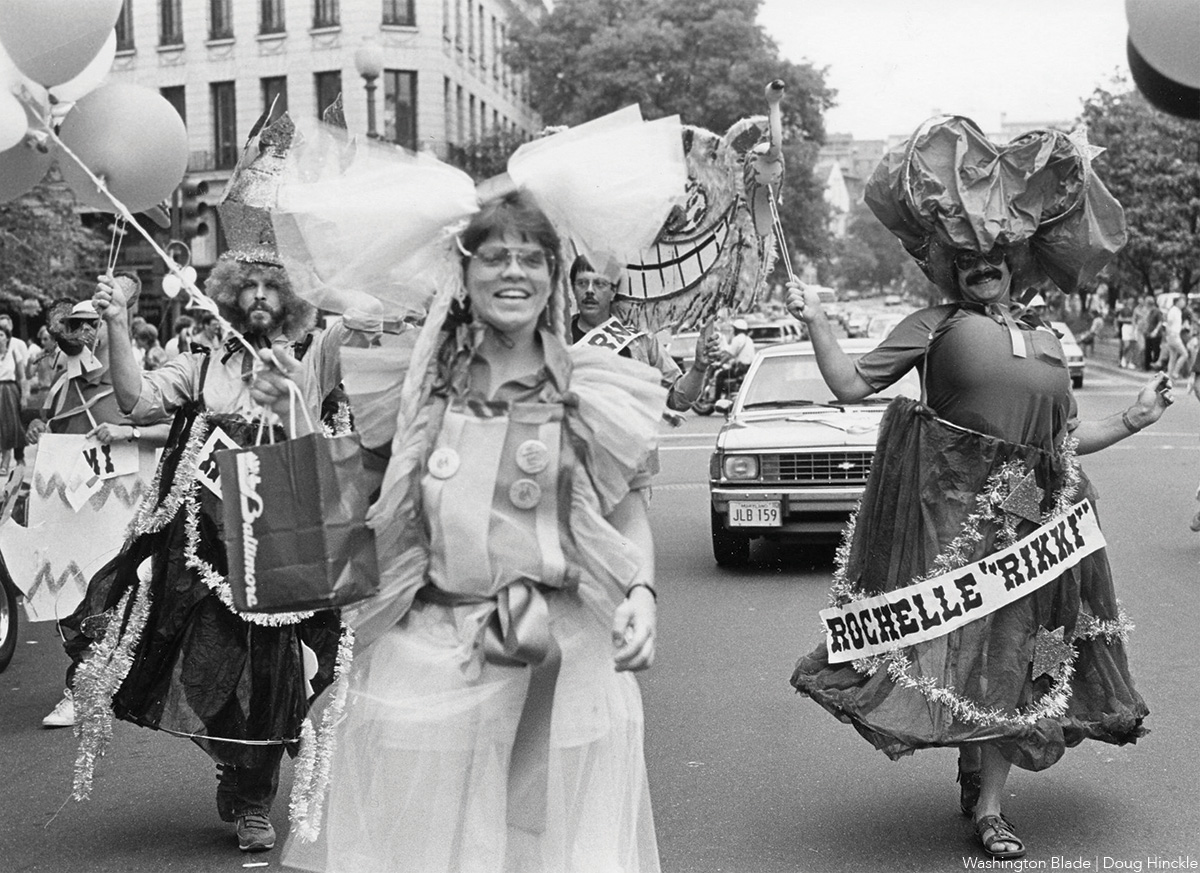
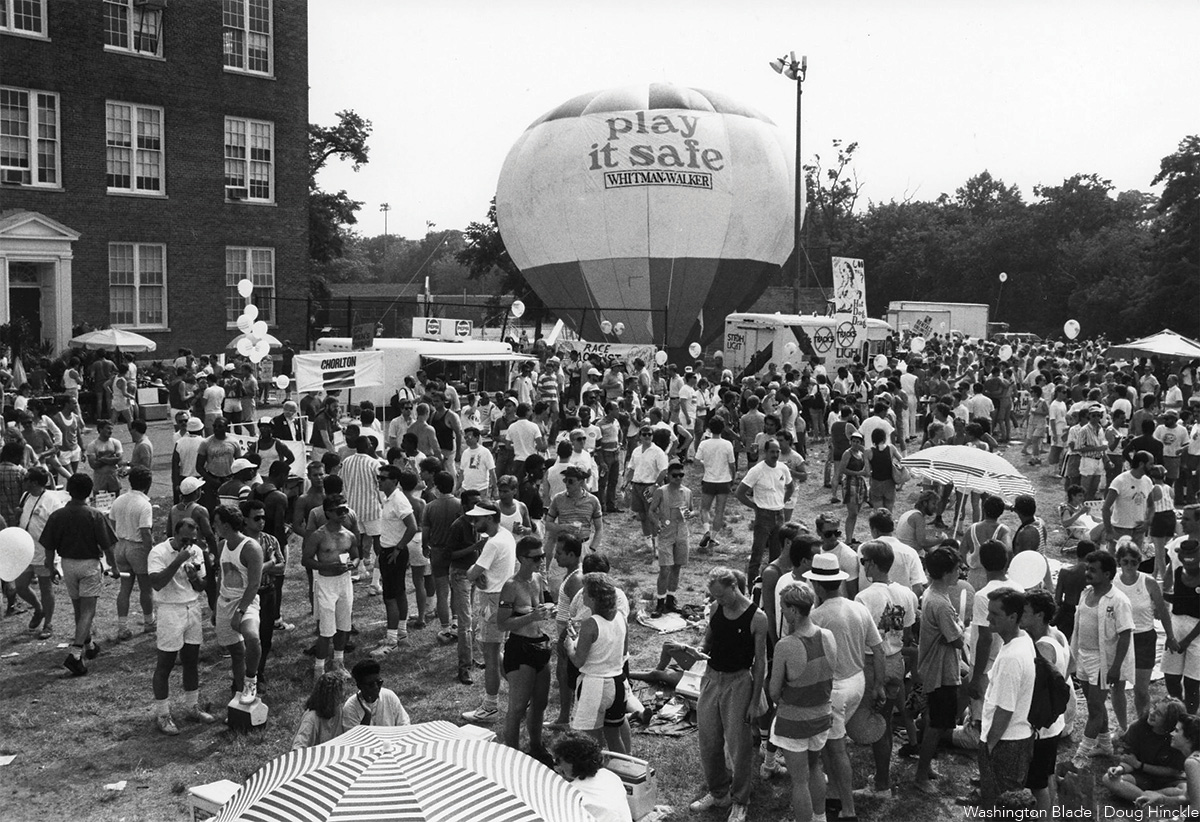
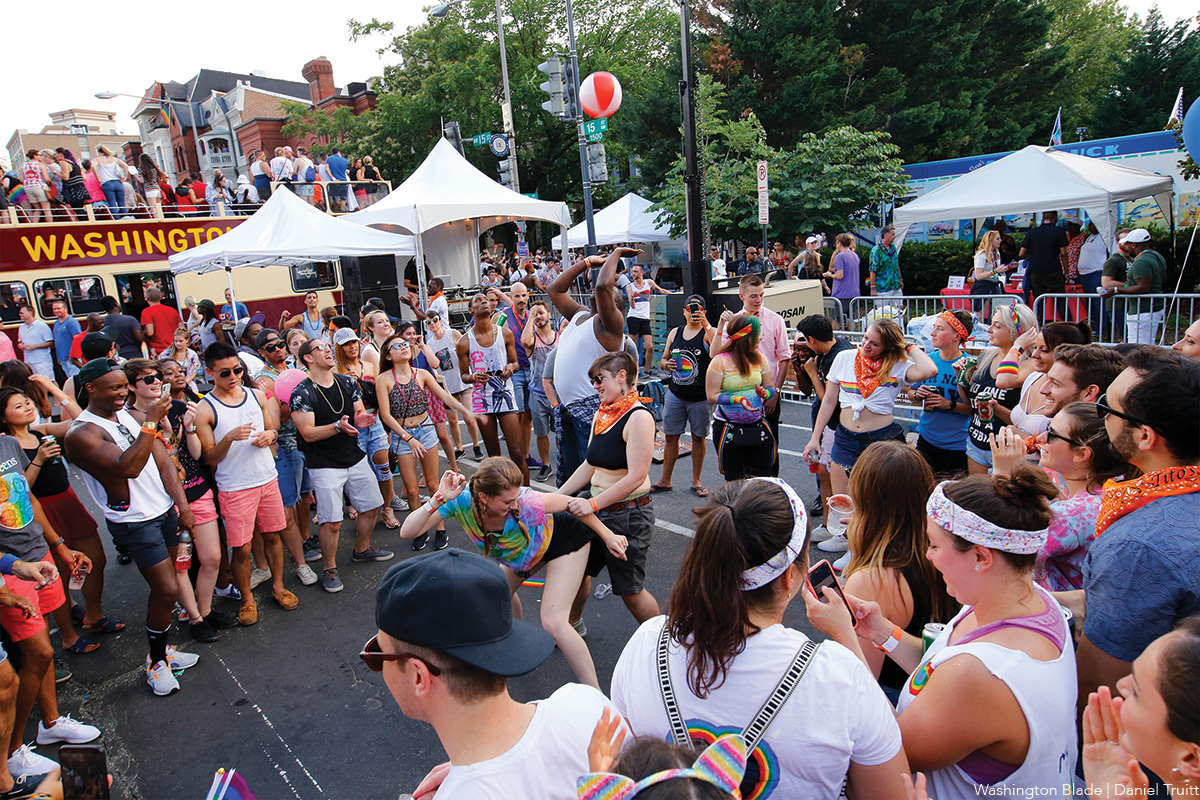
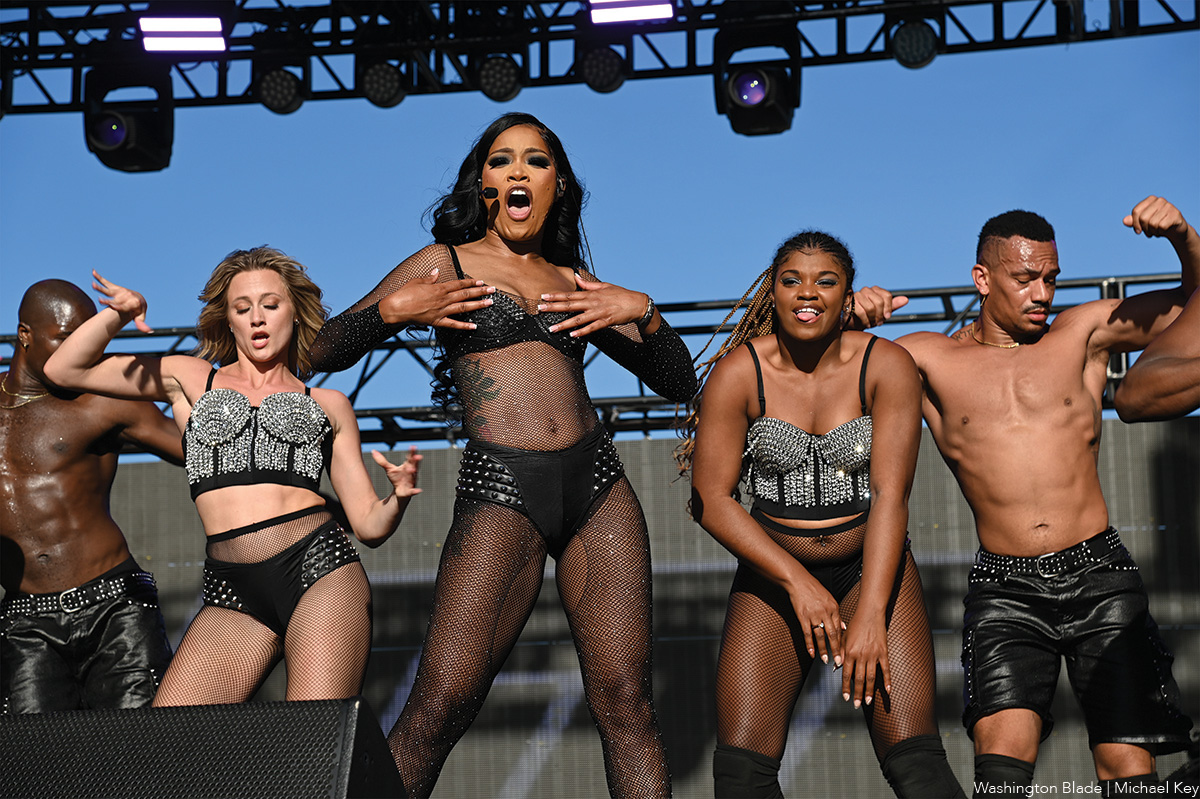
-

 U.S. Supreme Court3 days ago
U.S. Supreme Court3 days agoSupreme Court upholds ACA rule that makes PrEP, other preventative care free
-

 U.S. Supreme Court3 days ago
U.S. Supreme Court3 days agoSupreme Court rules parents must have option to opt children out of LGBTQ-specific lessons
-

 India5 days ago
India5 days agoIndian court rules a transgender woman is a woman
-

 National5 days ago
National5 days agoEvan Wolfson on the 10-year legacy of marriage equality











